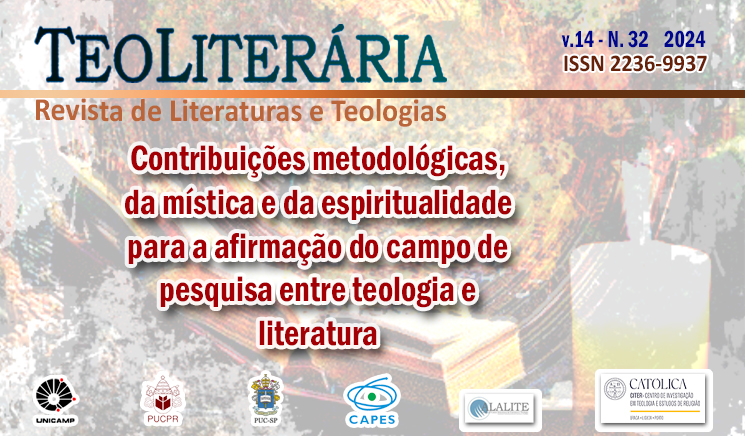Variantes del problema entre poesía y teología en Giovanni Boccaccio
DOI:
https://doi.org/10.23925/2236-9937.2024.63805Palavras-chave:
genealogía, poesía, filosofía, teología, poieisResumo
Este artigo analisa as variantes do problema abordado por Giovanni Boccaccio (1313-1375) em sua obra A Genealogia dos Deuses Pagãos (1360), especificamente nos dois últimos livros, XIV e XV, nos quais se concentram as referências ao problema da poesia e da teologia. Desde a síntese entre o pensamento grego e o cristão, chamada por Werner Jaeger de "teologia" filosófica que produziu uma reinterpretação das tradições pagãs ou cristãs nas religiões da Antiguidade tardia, até a Florença medieval, em meio a uma preeminência da mitologia cristã, onde a poesia é defendida enquanto ocorre uma renovação cultural que coloca em crise os limites entre poesia e filosofia. A Genealogia tem como base de sua defesa a sentença de Cícero (que tanto Petrarca quanto Boccaccio apresentam como a teoria com a qual o Renascimento começará), segundo a qual a poesia é de inspiração sobrenatural, em oposição à arte, que é uma técnica, e levanta a possibilidade de recuperar poetas como Homero para o cristianismo, como a filosofia escolástica faria com Aristóteles, partindo de um argumento filológico que Boccaccio usa para definir que a raiz etimológica da poesia é grega e não latina.
Referências
AUERBACH, Erich. Figura. Madrid: Trotta, 1998.
BOCCACCIO, Giovanni. Genealogía de los dioses paganos. Madrid: Editora Nacional, 1983.
BORGES, Jorge Luís. Obras Completas: edición crítica II. Buenos Aires: Emecé, 2010.
CICERÓN. Defensa del poeta Arquias. Madrid: Instituto nacional Antonio de Nebrija, 1940.
CIORDIA, Martín. “Perspectivas de investigación en los estudios renacentistas”, en Perspectivas actuales de la investigación literaria. Buenos Aires: Editorial de la Facultad de Filosofía y Letras de la Universidad de Buenos Aires, 2011.
CURTIUS, Ernst Robert. Literatura europea y Edad Media Latina II. Madrid: Fondo de Cultura Económica, 1995.
DELEUZE, Gilles. L’Abécédaire. Paris: Éd. Montparnasse, 1996.
ESTIÚ, Emilio. “El problema estético de la poesía y la pintura en Boccaccio”, en Giovanni Boccaccio : 1375-1975. Homenaje en el sexto centenario de su muerte. La Plata: UNLP, FAHCE, Departamento de Letras, Centro de Estudios Italianos, 1975.
GARIN, Eugenio. Ciencia y vida civil en el Renacimiento italiano. Madrid: Taurus, 1982.
GARIN, Eugenio. La revolución cultural del Renacimiento. Barcelona: Crítica, 1984.
GARIN, Eugenio. El hombre del Renacimiento. Madrid: Alianza Editorial, 1993.
GÓMEZ, Francisco Vicente. “El concepto de «dialoguismo» en Bajtín: La otra forma del diálogo renacentista” en Anuario de la Sociedad Española de Literatura General y Comparada, Anuario V, 1983-84, Alicante : Biblioteca Virtual Miguel de Cervantes, 2006, p. 47-54. Disponible en: http://www.cervantesvirtual.com/nd/ark:/59851/bmcns152. Acceso 10.11.2021.
HELLER, Ágnes. “La Antigüedad y la tradición judeocristiana”. En: El hombre del Renacimiento. Barcelona: Ediciones Península, 1994, p. 61-151.
JAEGER, Werner. Cristianismo primitivo y paideia griega. México, D.F.: Fondo de Cultura Económica, 1985.
KRISTELLER, Paul O. El pensamiento renacentista y las artes. Madrid: Taurus, 1986.
PETRONIO, Giuseppe. “Giovanni Boccaccio”. En: Historia de la Literatura Italiana. Madrid: Cátedra, 2009.
PLATÓN. La República. Buenos Aires: Eudeba, 1983.
RAMA, Ángel. Los gauchipolíticos rioplatenses. Buenos Aires: Centro Editor de América Latina, 1982.
TATARKIEWICZ, Władysław. Historia de seis ideas: Arte, belleza, forma, creatividad, mímesis, experiencia estética. Madrid: Tecnos, 2001.
TATARKIEWICZ, Władysław. Historia de la Estética: II. La estética medieval. Madrid: Akal, 2007.
VOSSLER, Karl. Formas poéticas de los pueblos románicos. Buenos Aires: Losada, 1960.
WHITE, Hayden. Ficción histórica, historia ficcional y realidad histórica. Buenos Aires: Prometeo Libros, 2010.
ŽIŽEK, Slavoj. El Dolor de Dios. Inversiones del apocalípsis. Madrid: Akal, 2013.
Downloads
Publicado
Como Citar
Edição
Seção
Licença
Copyright (c) 2024 TEOLITERARIA - Revista de Literaturas e Teologias

Este trabalho está licenciado sob uma licença Creative Commons Attribution 4.0 International License.
A TeoLiterária – Revista de Literaturas e Teologias é detentora dos direitos autorais de todos os artigos publicados por ela. A reprodução total dos textos em outras publicações, ou para qualquer outro fim, por quaisquer meios, requer autorização por escrito do editor. Reproduções parciais de artigos (resumo, abstract, mais de 500 palavras de texto, tabelas, figuras e outras ilustrações) deverão ter permissão por escrito do editor e dos autores.



